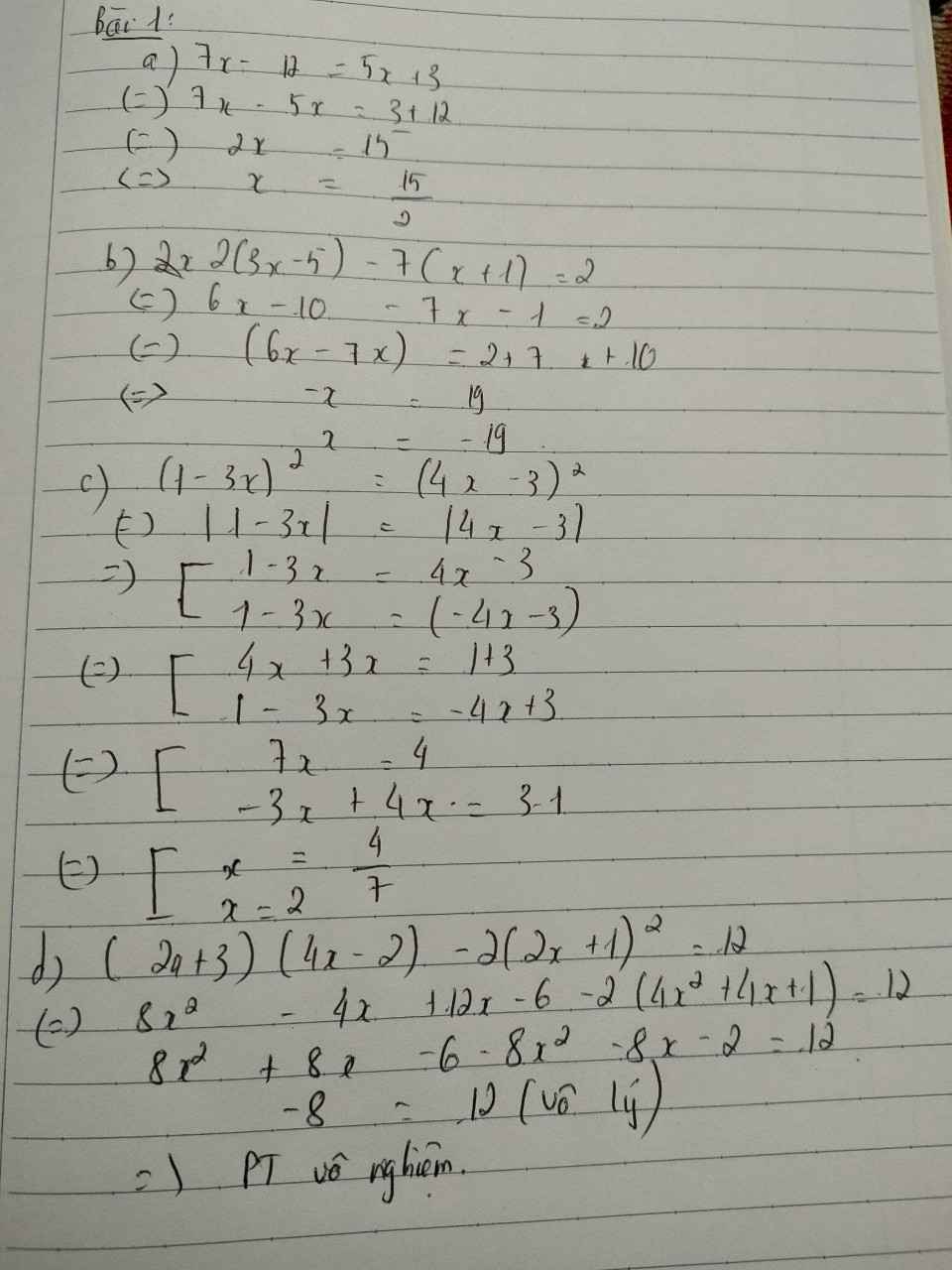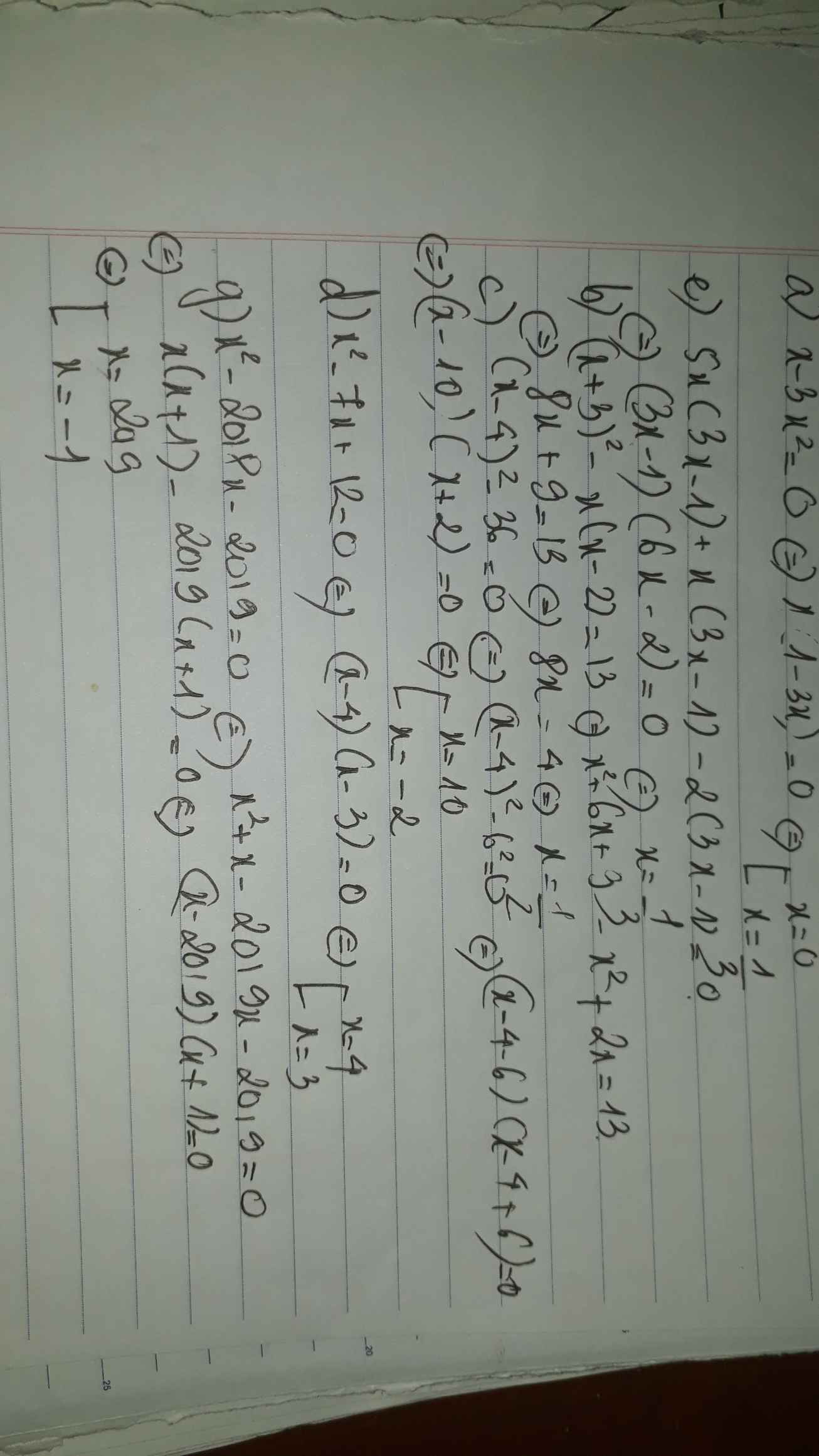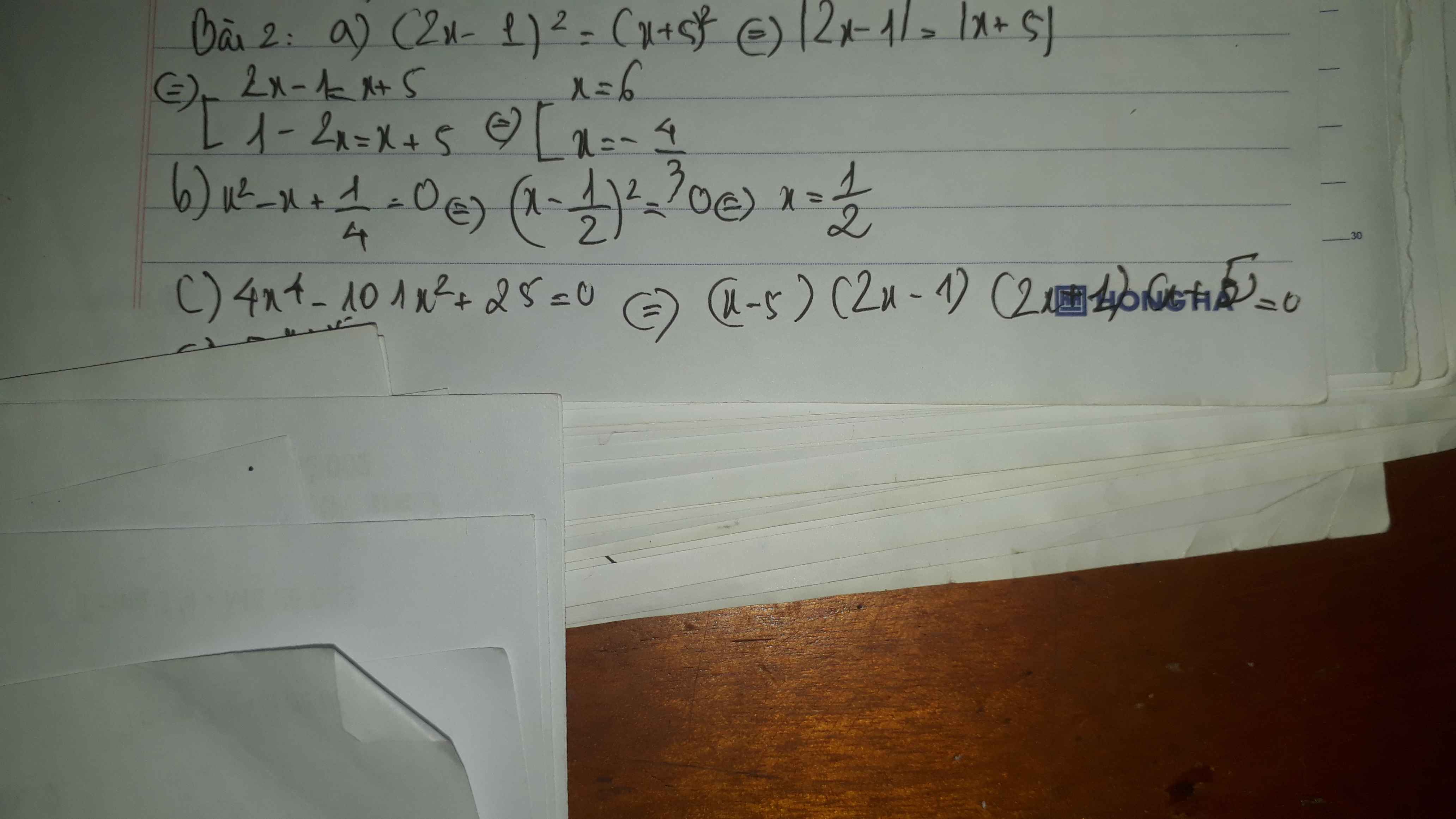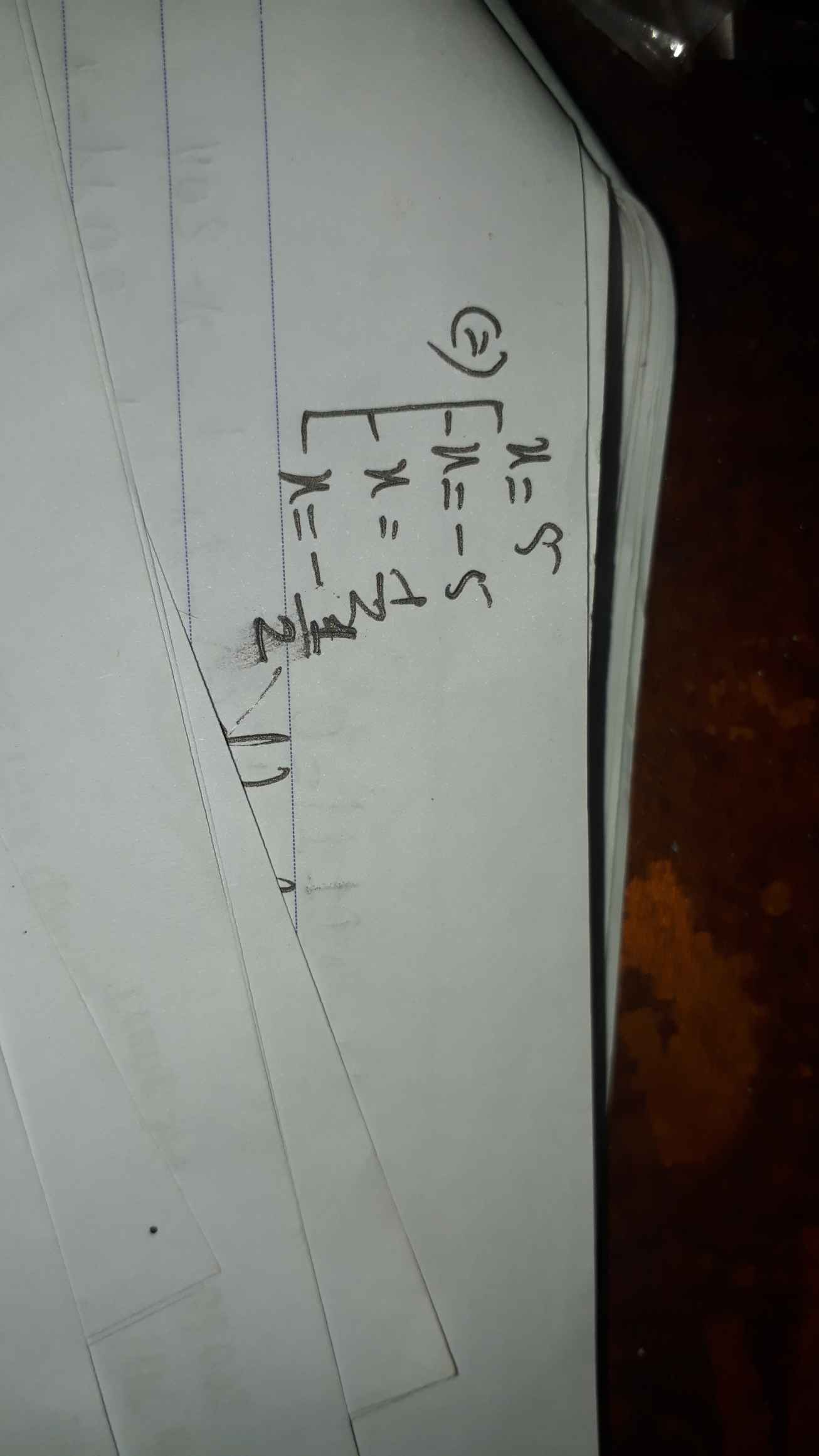Hãy nhập câu hỏi của bạn vào đây, nếu là tài khoản VIP, bạn sẽ được ưu tiên trả lời.

Bài 1:
a. $3x^3-12x^2+12x=3x(x^2-4x+4)=3x(x-2)^2$
b. $x^2-25+4xy+4y^2=(x^2+4xy+4y^2)-25=(x+2y)^2-5^2=(x+2y-5)(x+2y+5)$
c. $4x^3-x=x(4x^2-1)=x[(2x)^2-1^2]=x(2x-1)(2x+1)$
d. $x^2-x+2y-4y^2=(x^2-4y^2)-(x-2y)=(x-2y)(x+2y)-(x-2y)=(x-2y)(x+2y+1)$
Bài 2:
a. $3x(x-1)+x-1=0$
$\Leftrightarrow (x-1)(3x+1)=0$
$\Leftrightarrow x-1=0$ hoặc $3x+1=0$
$\Leftrightarrow x=1$ hoặc $x=\frac{-1}{3}$
b. $x(2x+1)-4x^2+1=0$
$\Leftrightarrow x(2x+1)-(4x^2-1)=0$
$\Leftrightarrow x(2x+1)-(2x-1)(2x+1)=0$
$\Leftrightarrow (2x+1)[x-(2x-1)]=0$
$\Leftrightarrow (2x+1)(-x+1)=0$
$\Leftrightarrow 2x+1=0$ hoặc $-x+1=0$
$\Leftrightarrow x=\frac{-1}{2}$ hoặc $x=1$

a) \(\left(2x-1\right)^2-25=0\)
⇔ \(\left(2x-1\right)^2-5^2=0\)
⇔ \(\left(2x-1-5\right)\left(2x-1+5\right)=0\)
⇒ \(2x-1-5=0\) hoặc \(2x-1+5=0\)
⇔ \(x=3\) hoặc \(x=-2\)
Bài 1: Tìm x
a) (2x-1) ² - 25 = 0
<=> (2x-1)2 = 25
<=> 2x-1 = 5 hay 2x-1 =-5
<=> 2x= 6 hay 2x=-4
<=> x=3 hay x= -2
Vậy S={3; -2}
b) 3x (x-1) + x - 1 = 0
<=> (x-1)(3x+1)=0
<=> x-1=0 hay 3x+1=0
<=> x=1 hay 3x=-1
<=> x=1 hay x=\(\dfrac{-1}{3}\)
Vậy S={1;\(\dfrac{-1}{3}\)}
c) 2(x+3) - x ² - 3x = 0
<=> 2(x+3)- x(x+3)=0
<=> (x+3)(2-x)=0
<=> x+3=0 hay 2-x=0
<=> x=-3 hay x=2
Vậy S={-3;2}
d) x(x - 2) + 3x - 6 = 0
<=> x(x-2)+3(x-2)=0
<=> (x-2)(x+3)=0
<=> x-2=0 hay x+3=0
<=> x=2 hay x=-3
Vậy S={2;-3}
e) 4x ² - 4x +1 = 0
<=> (2x-1)2=0
<=> 2x-1=0
<=> 2x=1
<=> x=\(\dfrac{1}{2}\)
Vậy S={\(\dfrac{1}{2}\)}
f) x +5x2 = 0
<=> x(1+5x)=0
<=>x=0 hay 1+5x=0
<=> x=0 hay 5x=-1
<=> x=0 hay x= \(\dfrac{-1}{5}\)
Vậy S={0;\(\dfrac{-1}{5}\)}
g) x ²+ 2x -3 = 0
<=> x2-x+3x-3=0
<=> x(x-1)+3(x-1)=0
<=> (x-1)(x+3)=0
<=> x-1=0 hay x+3=0
<=> x=1 hay x=-3
Vậy S={1;-3}

2a) pt <=> (x + 6)^2 = 0
<=> x = -6
b) pt <=> (4x - 1)^2 = 0
<=> x = 1/4
c) pt<=> (x + 1)^3 = 0
<=> x = -1
Bài 1:
a: Ta có: \(A=\left(4x+3y\right)^2+\left(4x-3y\right)^2\)
\(=16x^2+24xy+9y^2+16x^2-24xy+9y^2\)
\(=32x^2+18y^2\)
b: Ta có: \(B=\left(x-2\right)^3-\left(x+2\right)^3\)
\(=x^3-6x^2+12x-8-x^3-6x^2-12x-8\)
\(=-12x^2-24\)

Bài 2:
a: Ta có: \(x^2+12x+36=0\)
\(\Leftrightarrow x+6=0\)
hay x=-6
b: Ta có: \(16x^2-8x+1=0\)
\(\Leftrightarrow4x-1=0\)
hay \(x=\dfrac{1}{4}\)
Bài 1:
a: Ta có: \(A=\left(4x+3y\right)^2+\left(4x-3y\right)^2\)
\(=16x^2+24xy+9y^2+16x^2-24xy+9y^2\)
\(=32x^2+18y^2\)
b: Ta có: \(B=\left(x-2\right)^3-\left(x+2\right)^3\)
\(=x^3-6x^2+12x-8-x^3-6x^2-12x-8\)
\(=-12x^2-24\)
c: Ta có: \(C=\left(x+2y\right)^2+2\left(x+2y\right)\left(x-2y\right)+\left(x-2y\right)^2\)
\(=\left(x+2y+x-2y\right)^2\)
\(=4x^2\)

a) 3x(4x-3)-2x(5-6x)=0
\(\Leftrightarrow12x^2-9x-10x+12x^2=0\)
\(\Leftrightarrow24x^2-19x=0\)
\(\Leftrightarrow x\left(24x-19\right)=0\)
\(\Leftrightarrow\left[{}\begin{matrix}x=0\\24x-19=0\end{matrix}\right.\Leftrightarrow\left[{}\begin{matrix}x=0\\24x=19\end{matrix}\right.\Leftrightarrow\left[{}\begin{matrix}x=0\\x=\dfrac{19}{24}\end{matrix}\right.\)
Vậy x=0 hoặc x=\(\dfrac{19}{24}\)

Bài 1:
a.
$(4x^2+4x+1)-x^2=0$
$\Leftrightarrow (2x+1)^2-x^2=0$
$\Leftrightarrow (2x+1-x)(2x+1+x)=0$
$\Leftrightarrow (x+1)(3x+1)=0$
$\Rightarrow x+1=0$ hoặc $3x+1=0$
$\Rightarrow x=-1$ hoặc $x=-\frac{1}{3}$
b.
$x^2-2x+1=4$
$\Leftrightarrow (x-1)^2=2^2$
$\Leftrightarrow (x-1)^2-2^2=0$
$\Leftrightarrow (x-1-2)(x-1+2)=0$
$\Leftrightarrow (x-3)(x+1)=0$
$\Leftrightarrow x-3=0$ hoặc $x+1=0$
$\Leftrightarrow x=3$ hoặc $x=-1$
c.
$x^2-5x+6=0$
$\Leftrightarrow (x^2-2x)-(3x-6)=0$
$\Leftrightarrow x(x-2)-3(x-2)=0$
$\Leftrightarrow (x-2)(x-3)=0$
$\Leftrightarrow x-2=0$ hoặc $x-3=0$
$\Leftrightarrow x=2$ hoặc $x=3$
2c.
ĐKXĐ: $x\neq 0$
PT $\Leftrightarrow x-\frac{6}{x}=x+\frac{3}{2}$
$\Leftrightarrow -\frac{6}{x}=\frac{3}{2}$
$\Leftrightarrow x=-4$ (tm)
2d.
ĐKXĐ: $x\neq 2$
PT $\Leftrightarrow \frac{1+3(x-2)}{x-2}=\frac{3-x}{x-2}$
$\Leftrightarrow \frac{3x-5}{x-2}=\frac{3-x}{x-2}$
$\Rightarrow 3x-5=3-x$
$\Leftrightarrow 4x=8$
$\Leftrightarrow x=2$ (không tm)
Vậy pt vô nghiệm.

1.
a.\(\Leftrightarrow7x-5x=3+12\)
\(\Leftrightarrow2x=15\Leftrightarrow x=\dfrac{15}{2}\)
b.\(\Leftrightarrow6x-10-7x-7=2\)
\(\Leftrightarrow x=-19\)
c.\(\Leftrightarrow1-3x=4x-3\)
\(\Leftrightarrow7x=2\Leftrightarrow x=\dfrac{2}{7}\)
d.\(\Leftrightarrow8x^2-4x+12x-6-8x^2-8x-2=12\)
\(\Leftrightarrow-2=12\left(voli\right)\)

$ a/ 12x(x – 5) – 3x(4x - 10) = 120$
`<=>12x^2-60x-12x^2+30x=120`
`<=>-30x=120`
`<=>x=-4`
Vậy `x=-4`
$b/ 9x(x + 4) – 5x(3x + 2) = 112 - 2x(3x + 1)$
`<=>9x^2+36x-15x^2-10x=112-6x^2-2x`
`<=>-6x^2+26x=112-6x^2-2x`
`<=>28x=112`
`<=>x=4`
Vậy `x=4`
$c/ 3x(1 – x) - 5x(3x + 7) = 154 + 9x(5 – 2x)$
`<=>3x-3x^2-15x^2-35x=154+45x-18x^2`
`<=>-32x-18x^2=154+45x-18x^2`
`<=>77x=-154`
`<=>x=-2`
Vậy `x=-2`


 Bài 1.
Bài 1.


Bài 1:
a) \(x^2-5x+1=0\)
\(\Leftrightarrow\left(x^2-5x+\frac{25}{4}\right)-\frac{21}{4}=0\)
\(\Leftrightarrow\left(x-\frac{5}{2}\right)^2-\frac{\left(\sqrt{21}\right)^2}{2^2}=0\)
\(\Leftrightarrow\left(x-\frac{5+\sqrt{21}}{2}\right)\left(x+\frac{\sqrt{21}-5}{2}\right)=0\)
\(\Leftrightarrow\orbr{\begin{cases}x-\frac{5+\sqrt{21}}{2}=0\\x+\frac{\sqrt{21}-5}{2}=0\end{cases}}\Rightarrow\orbr{\begin{cases}x=\frac{5+\sqrt{21}}{2}\\x=\frac{5-\sqrt{21}}{2}\end{cases}}\)
b) \(3x^2-12x-1=0\)
\(\Leftrightarrow3\left(x^2-4x+4\right)-13=0\)
\(\Leftrightarrow\left(x-2\right)^2-\left(\sqrt{\frac{13}{3}}\right)^2=0\)
\(\Leftrightarrow\left(x-2-\sqrt{\frac{13}{3}}\right)\left(x-2+\sqrt{\frac{13}{3}}\right)=0\)
\(\Rightarrow\orbr{\begin{cases}x=2+\sqrt{\frac{13}{3}}\\x=2-\sqrt{\frac{13}{3}}\end{cases}}\)
Bài 2:
a) \(A=\frac{1}{4}x^2-x+1=\left(\frac{1}{2}x-1\right)^2\ge0\left(\forall x\right)\)
Dấu "=" xảy ra khi: \(\left(\frac{1}{2}x-1\right)^2=0\Rightarrow\frac{1}{2}x=1\Rightarrow x=2\)
Vậy Min(A) = 0 khi x = 2
b) \(B=3x^2-4x-2=3\left(x^2-\frac{4}{3}x+\frac{4}{9}\right)-\frac{10}{3}=3\left(x-\frac{2}{3}\right)^2-\frac{10}{3}\ge-\frac{10}{3}\left(\forall x\right)\)
Dấu "=" xảy ra khi: \(3\left(x-\frac{2}{3}\right)^2=0\Rightarrow x=\frac{2}{3}\)
Vậy \(Min\left(B\right)=-\frac{10}{3}\Leftrightarrow x=\frac{2}{3}\)